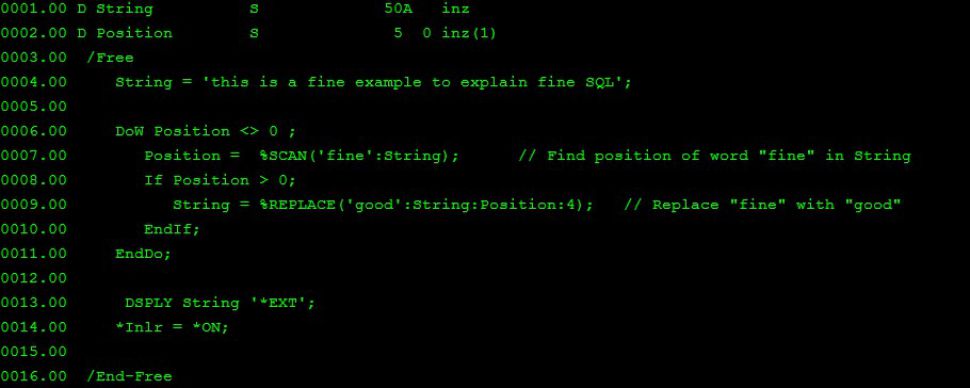SQL is always much better than RPG for handling string data.
Embedding SQL in RPG gives RPG the great power not only to handle database operations but also to perform string manipulation. For string manipulation, RPG provides some very basic functions, such as %TRIM, %SUBST, %SCAN, and %REPLACE.
Suppose you want to convert a string to uppercase. How can you do that in RPG? By using the %XLATE function and a couple of constants containing all 26 letters of the alphabet. Something like this:

Figure 1: Convert a string to uppercase in RPG.
Here's the output:
![]()
Technically, this is more a search and replace function, where %XLATE searches each character of LOWER and replaces that with corresponding character of UPPER. Changing the case of a string is a basic concept in "string manipulation." Most languages, including SQL, offer simple functions for this.
Here's an example of how we can use the SQL UPPER function to convert a string into uppercase (or LOWER to convert into lowercase).

Figure 2: Convert to uppercase with SQL.
Output:
![]()
EXEC SQL tells the system that this is an SQL statement. SET is used in SQL to set/update the value of the variables. In this example, we passed a host variable NAME to SQL function UPPER and assigned the value back to the same host variable using SET. We can use the SQL LOWER function the same way to convert to lowercase.
Let's Look at SCAN and REPLACE
I have a string 'this is a fine example to explain fine SQL'. Now I want to replace all occurrences of fine with good. In RPG, I have to use a loop, inside which I have to use two functions:
- %SCAN to find fine
- %REPLACE to replace fine with good
The RPG code will be as shown below. First, find the position of fine using %SCAN, and then try to replace it with good based on position, as %REPLACE works only with position, not the actual word.

Figure 3: Find and replace using RPG.
Output:
![]()
We can achieve the same result with the SQL REPLACE function. In this example, three parameters are passed to the SQL REPLACE function:
- String: This is the host variable containing the source string.
- 'fine' : This is the string we want to find in the source string. We can use the host variable also.
- 'good': This is new string we want in the source. We can use the host variable also.
The REPLACE function will find all the occurrences for fine and replace it with good.

Figure 4: Find and replace using SQL.
Here's the output:
![]()
Example Use of %TRIM
If I have a string like 'this is a very good website@@@' and I want to remove all trailing @ characters. With the SQL TRIM function, I can achieve this very easily. Here's an example: [Correction : Same results can be achived by RPG %TRIM function.Main difference between RPG and SQL TRIM functions is that SQL have only one TRIM function which can be used to trim from both sides , right side or left side based on parameter given where RPG have 3 different functions for these tasks]

Figure 5: %TRIM removes leading or trailing blanks.
Here's the output:
![]()
In the same way, we can use any SQL function in RPG. Check this link for a list of available SQL functions.












 Business users want new applications now. Market and regulatory pressures require faster application updates and delivery into production. Your IBM i developers may be approaching retirement, and you see no sure way to fill their positions with experienced developers. In addition, you may be caught between maintaining your existing applications and the uncertainty of moving to something new.
Business users want new applications now. Market and regulatory pressures require faster application updates and delivery into production. Your IBM i developers may be approaching retirement, and you see no sure way to fill their positions with experienced developers. In addition, you may be caught between maintaining your existing applications and the uncertainty of moving to something new. IT managers hoping to find new IBM i talent are discovering that the pool of experienced RPG programmers and operators or administrators with intimate knowledge of the operating system and the applications that run on it is small. This begs the question: How will you manage the platform that supports such a big part of your business? This guide offers strategies and software suggestions to help you plan IT staffing and resources and smooth the transition after your AS/400 talent retires. Read on to learn:
IT managers hoping to find new IBM i talent are discovering that the pool of experienced RPG programmers and operators or administrators with intimate knowledge of the operating system and the applications that run on it is small. This begs the question: How will you manage the platform that supports such a big part of your business? This guide offers strategies and software suggestions to help you plan IT staffing and resources and smooth the transition after your AS/400 talent retires. Read on to learn:
LATEST COMMENTS
MC Press Online